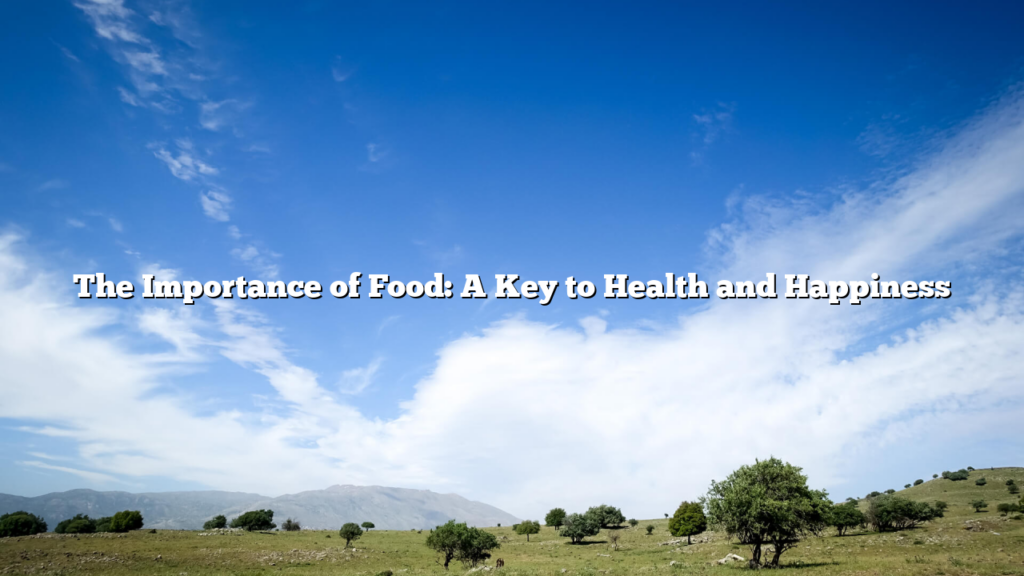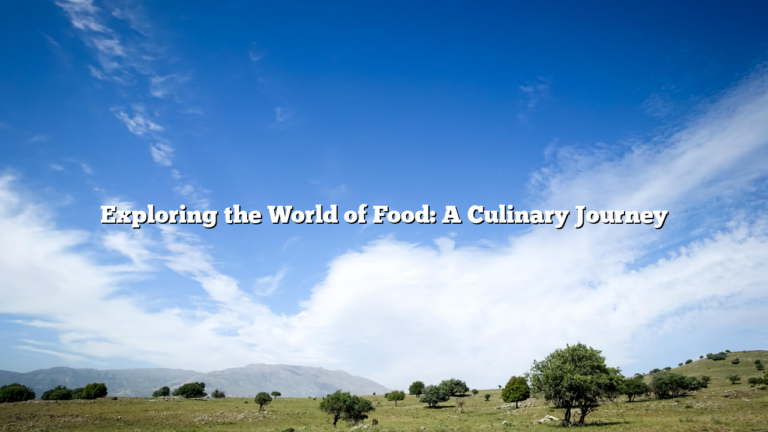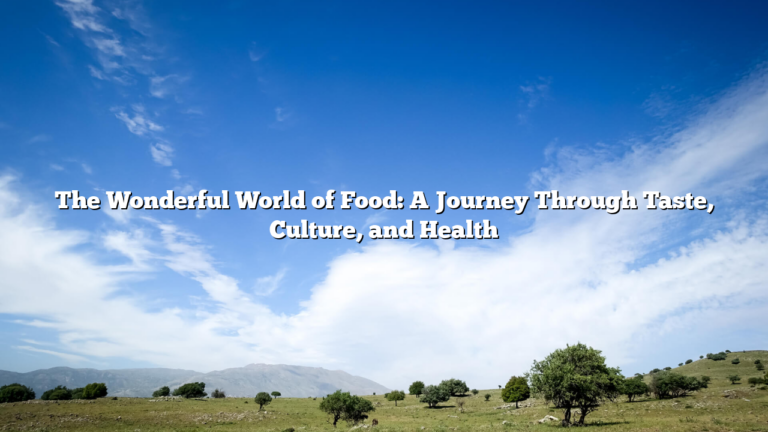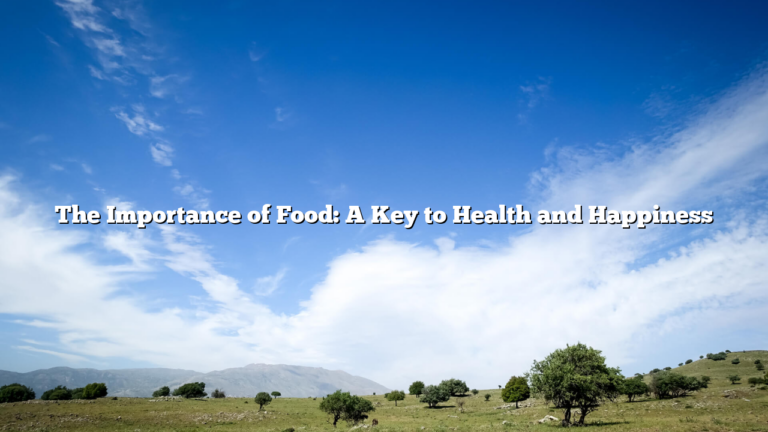
The Importance of Food: A Key to Health and Happiness
Food is one of the most essential components of human life. It not only provides us with the
nutrients and energy we need to function but also brings people together and plays an
integral part in cultural traditions and celebrations. The relationship between food and human
life is profound, as it affects physical health, mental well-being, and social connections. This
article will explore the different types of food, the benefits they provide, and how food
contributes to our overall quality of life.
The Role of Food in Our Lives
Food is more than just fuel for the body. It sustains life, provides essential nutrients, and
impacts our mood and energy levels. The human body requires a balanced diet to function
optimally, and the food we consume is the primary source of this balance. Nutrients, such as
carbohydrates, proteins, fats, vitamins, and minerals, are crucial for various bodily functions,
including immune system support, energy production, tissue repair, and cognitive function.
In today’s fast-paced world, food has also become an emotional and social experience.
Sharing meals with loved ones is an important aspect of building relationships and creating
lasting memories. Moreover, food plays a significant role in cultural practices, with traditional
recipes often passed down from generation to generation, helping people stay connected to
their heritage.
Categories of Food and Their Benefits
Food can be categorized into different groups based on their nutrient content. These groups
include fruits, vegetables, grains, proteins, dairy products, and fats. Each category provides
specific health benefits and should be included in a balanced diet.
1. Fruits and Vegetables: Fruits and vegetables are rich in vitamins, minerals, and fiber. They
are low in calories, making them an excellent choice for anyone looking to maintain a healthy
weight. Additionally, they are packed with antioxidants, which help combat free radicals in
the body and reduce inflammation. Regular consumption of fruits and vegetables has been
linked to a lower risk of chronic diseases such as heart disease, diabetes, and cancer.
Some examples include leafy greens like spinach, kale, and arugula, which are high in
vitamin K and folate, and fruits like berries, oranges, and apples, which are loaded with
vitamins C and E, both of which boost the immune system.
2. Grains: Grains, such as rice, oats, quinoa, and wheat, are the primary source of
carbohydrates in most diets. Carbohydrates provide the body with a quick source of energy.
Whole grains are particularly beneficial because they are rich in fiber, which aids digestion
and helps to regulate blood sugar levels.
Whole grains also contain important B vitamins and minerals like iron, magnesium, and zinc.
These nutrients support the nervous system, maintain bone health, and promote overall
vitality. Incorporating whole grains into your diet, such as through whole wheat bread or
brown rice, can improve long-term health outcomes.
3. Proteins: Proteins are essential for the growth, repair, and maintenance of body tissues.
They are made up of amino acids, which are the building blocks of muscles, enzymes, and
hormones. Common sources of protein include meat, poultry, fish, eggs, beans, nuts, and
seeds.
Fish, such as salmon, is particularly beneficial because it is rich in omega-3 fatty acids,
which are known to support brain health and reduce inflammation. For vegetarians and
vegans, plant-based protein sources like lentils, chickpeas, tofu, and quinoa are great
alternatives.
4. Dairy Products: Dairy products, including milk, cheese, and yogurt, are rich sources of
calcium, which is crucial for bone health. Dairy also provides vitamin D, protein, and other
nutrients like potassium and magnesium. These nutrients help strengthen bones, muscles,
and teeth, and they also support the cardiovascular system.
For those who are lactose intolerant or avoid dairy products for other reasons, fortified
plant-based alternatives such as almond milk or soy yogurt can offer similar benefits.
5. Fats: While fats often get a bad reputation, they are an essential part of a healthy diet.
Healthy fats, such as those found in avocados, nuts, seeds, and olive oil, support brain
function, regulate hormones, and protect vital organs.
It’s important to distinguish between healthy fats and unhealthy fats. Unsaturated fats, which
are found in plant-based oils and fish, can help lower bad cholesterol levels and reduce the
risk of heart disease. On the other hand, trans fats and excessive saturated fats, typically
found in processed foods, should be limited.
The Importance of a Balanced Diet
A balanced diet is crucial for maintaining overall health and well-being. This means
incorporating a variety of foods from all food groups and eating them in the right proportions.
The key to balance lies in moderation and diversity. While no single food can provide all the
nutrients the body needs, a combination of different foods can ensure that you receive the
full spectrum of vitamins, minerals, and other nutrients required for optimal health.
Additionally, staying hydrated is equally important. Water is essential for digestion, nutrient
absorption, and maintaining the body’s temperature. Drinking an adequate amount of water
throughout the day supports all bodily functions and helps to keep the skin healthy and the
mind alert.
Food and Mental Health
Food doesn’t just influence physical health; it also affects mental well-being. What we eat
can impact our mood, stress levels, and cognitive function. Diets rich in omega-3 fatty acids,
vitamins, and minerals have been shown to support brain health and improve mental clarity
and memory. Conversely, diets high in processed foods, sugar, and unhealthy fats can
contribute to mental fatigue, mood swings, and a higher risk of mental health issues such as
anxiety and depression.
Food in Cultural Contexts
Food also plays a significant role in cultural identity. Every culture has its own unique dishes,
flavors, and cooking techniques. Food is an integral part of cultural rituals, celebrations, and
social gatherings, whether it’s a traditional feast, a family dinner, or a community event.
Sharing food allows people to connect, share stories, and pass on traditions to younger
generations.
Conclusion
In conclusion, food is an essential aspect of life that goes beyond just satisfying hunger. It is
the foundation of good health, social bonding, and cultural expression. By understanding the
different types of food and the important nutrients they provide, we can make informed
decisions about our diets and improve our overall quality of life. Whether link ketuaslot ’s the nutrients
from fruits and vegetables, the energy from grains, or the protein needed for muscle growth,
each food group plays a crucial role in sustaining our bodies and minds. With the right
balance, food can be the key to living a healthy, fulfilling life.



